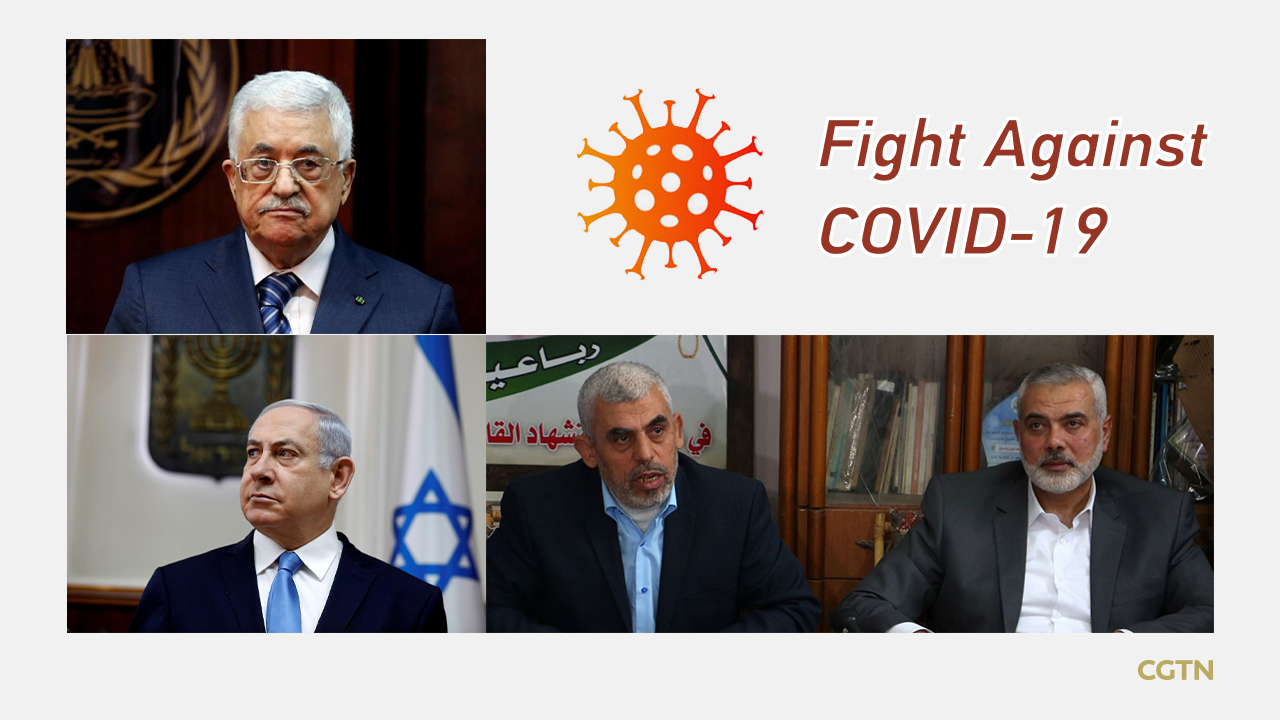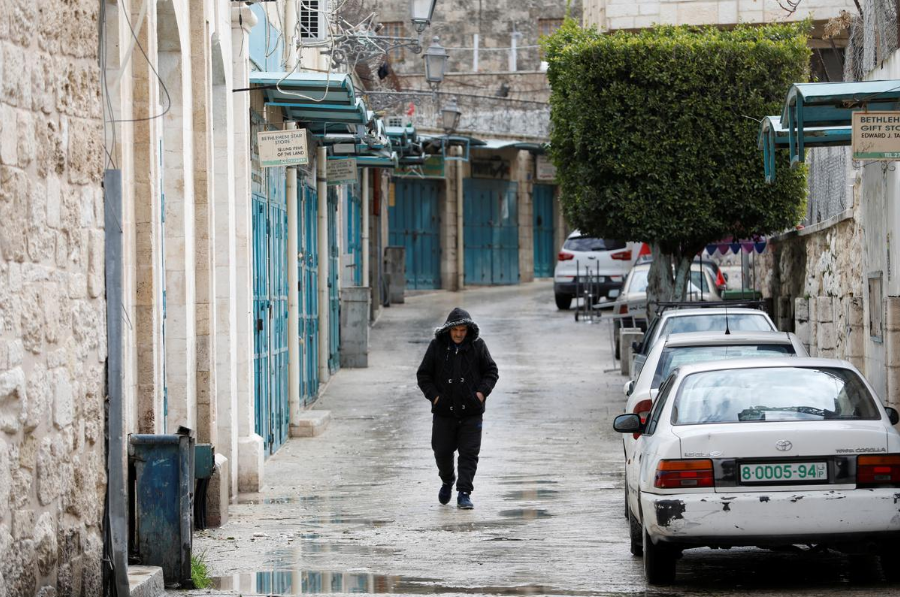
Palestinian health officials confirmed on Sunday the first two coronavirus cases in the densely-populated Gaza Strip, making it another region affected by the global pandemic.
Two Palestinians who had traveled from Pakistan and entered Gaza through Egypt had tested positive for the virus late on Saturday and have been in quarantine in Rafah, a town near the Egyptian border, since their arrival on Thursday, the Gaza health ministry said.
The coastal enclave, measuring 375 square kilometers (145 square miles), is home to around two million Palestinians and poverty and unemployment rates are high.
An Israeli-led blockade has put restrictions on the movement of people and goods for years, amid security concerns following the 2007 takeover of Gaza by the Islamist militant group Hamas, three subsequent wars and frequent rounds of violence.
It was believed that Gaza only had enough testing kits for fewer than 200 and about 20 available ventilation devices. Meanwhile, doctors are also scant in number and hospitals suffer from an acute deficit in medical supplies.
Given the appallingly poor conditions of the health care system, the Hamas-led government has been quick to take precautions, even though there were previously no cases reported in the area.
Schools, public markets and event halls have all been shut in Gaza over the past two weeks to minimize the risk of coronavirus transmission. Authorities have also been stepping up efforts in increasing testing capacity and temporary quarantine centers have been opened, mostly at schools. Hamas has also placed about 1,400 Gazans under quarantine.
Last week Hamas said it would allow only patients requiring urgent medical treatment outside Gaza to cross into Egypt or Israel.
Previously in an effort to help equip Gazans to prepare for an outbreak, Qatar has pledged an economic aid of 10 million U.S. dollars to Gaza and the World Bank has transferred seven million U.S. dollars to the Palestinian Authority (PA).
Israel has also been sending medical essentials such as testing kits and protective gears to both the PA and directly to Gaza. These supplies were organized by Israel's Coordinator of Government Activities in the Territories (COGAT), which is a military unit in Israel's Defense Ministry.
"Viruses and illnesses have no borders – therefore, it is in Israel's best interests to prevent the spread of the coronavirus in the Gaza Strip and its outbreak in the territories of Judea and Samaria. This is in Israel's interests because such an outbreak may well endanger the health of the residents of State of Israel as well," COGAT head Maj. Gen. Kamil Abu Rokon said.
Observers have noted that since COVID-19 has spread to the region, cooperation between Israel and the Palestinian authorities has been unprecedentedly tight. Annexation talks that previously dominated Israeli politics have been absent and the chronic clashes between Israel and the Gazan factions have been unofficially put on pause.
According to Israel's Haaretz, Israeli officials had been concerned with a possible outbreak in Gaza and mulled the idea of taking patients from there but wariness of its own shortage in the medical system prevented them from making any substantial plans.
Since the outbreak first erupted in Bethlehem, Israel and the PA have been frequently coordinating their efforts in combating the virus. The latest manifestation of the tight cooperation was an agreement reached between the two sides over the entry of workers from the West Bank into Israel. Tens of thousands of Palestinians workers from the West Bank have since entered Israel, which, as far as Israel is concerned, can help prevent the breakdown of construction companies and factories while limiting movement between Israel and the West Bank to reduce the risk of infection.

Shops are closed as preventive measures against the coronavirus, in Bethlehem in the Israeli-occupied West Bank, March 6, 2020. /Reuters
Shops are closed as preventive measures against the coronavirus, in Bethlehem in the Israeli-occupied West Bank, March 6, 2020. /Reuters
But this agreement was made in the face of strong opposition voiced by Israel's security establishment and came at the price of cancelling the originally planned entry of 7,000 Gazan workers.
Anees Sweidan, director of the Arab Affairs Department in the PLO, told the U.S.-based news outlet Al-Monitor that the health crisis facilitated cooperation and talks in other areas. "There is the issue of Palestinian workers in Israel, the Palestinian funds still held up by the Israelis, the need to end the security incursions into the Palestinians areas and to have older prisoners released."
As tackling each of these issues could bring substantial relief to the entirety of Palestinians particularly at this critical time, talks between the two sides would more likely produce results.
While coronavirus cases have first arrived at Gaza, Israel reported its first fatality – an 88-year-old man who suffered from other illnesses and arrived at Jerusalem's Shaare Zedek Medical Center about a week ago in critical condition.
883 Israelis have so far tested positive for COVID-19. The West Bank has confirmed 53 cases, with the majority of them in Bethlehem.
Israel has taken stringent steps to contain coronavirus – closing schools, malls, restaurants and most places of leisure, as well as limiting gatherings to 10 people. In what appears to be a highly controversial measure, Prime Minister Benjamine Netanyahu decided to use anti-terrorist technology to track infected people and anyone with whom they have come in contact.
Concerns with the move were articulated from human rights groups to top security officials, who worry about how the decision was made and what its repercussions could be: exposure of Israeli intelligence methods, leaks of personal information and a worrisome precedent for democracy.
Observers have noted that Netanyahu has seized the initiative from the moment when the spread of the COVID-19 was still limited to China's Hubei Province, by positioning himself at the center while pushing the health minister to the sidelines. The measures taken by the prime minister have been much more drastic than other countries and seemingly disproportional to the severity of the outbreak inside the country. Some believed the proactive approach won Netanyahu approvals from Israeli voters in the March 2 election.
Apart from cooperating with Israeli authorities, the PA was also very quick to respond to the outbreak. It declared a state of emergency right after the first case in Bethlehem was reported, and took drastic measures similar to Israel.
Palestinian President Mahmoud Abbas said on Thursday that the PA has so far been able to keep the risk of coronavirus further spreading to the bare minimum.
"We are doing our best and making use of all our potential to confront this dangerous virus that is attacking the entire world. We are working through specialized institutions to protect our people from [the disease]," he continued.
(With input from agencies)